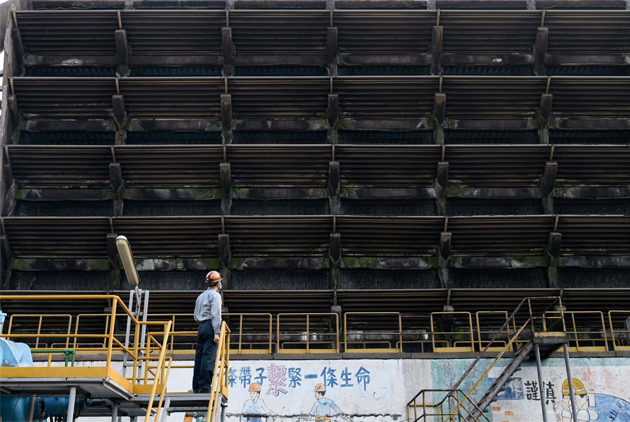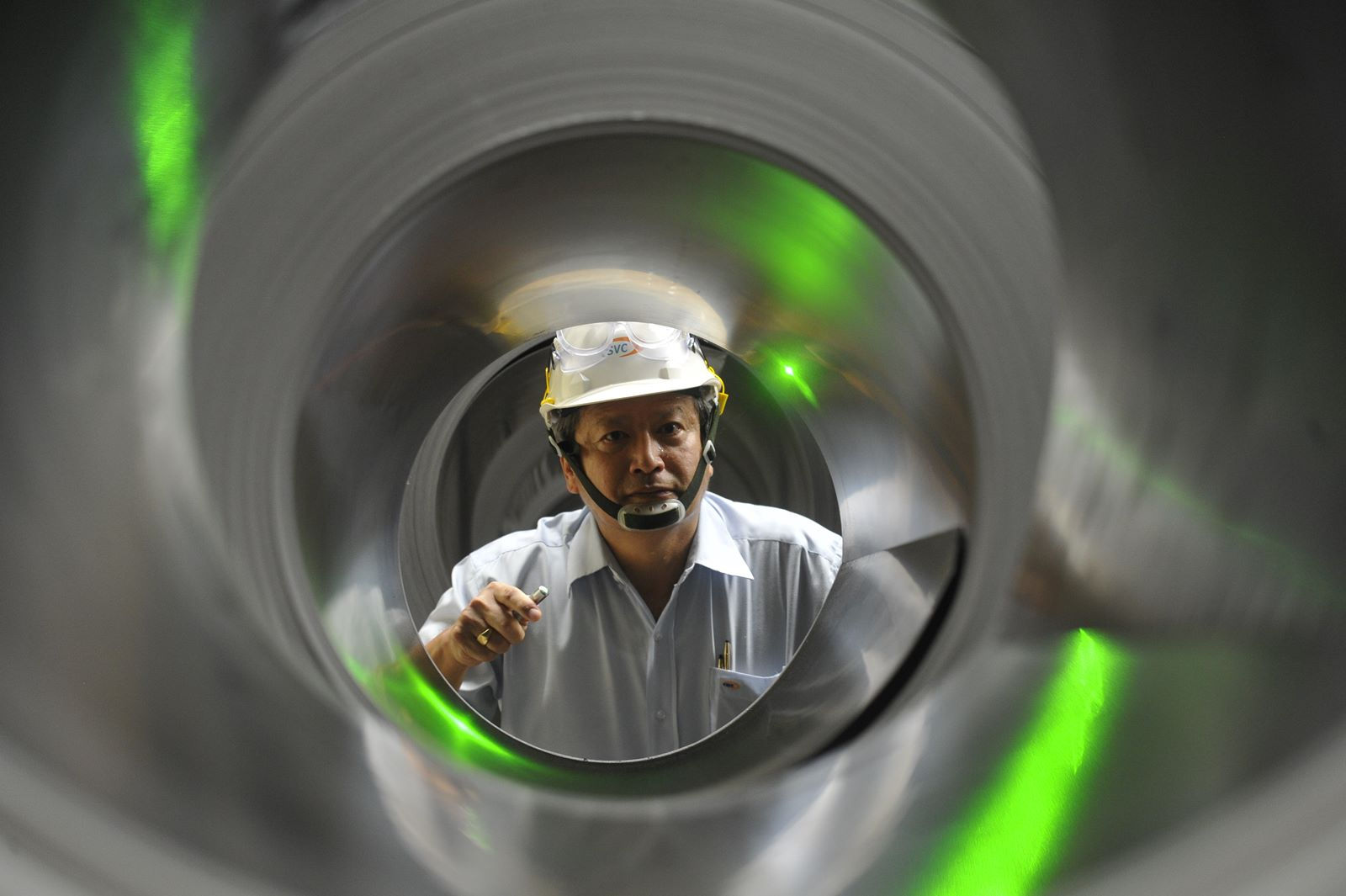Phasing out nuclear amidst power rationing causes steel prices to soar

Source:Pei-Yin Hsieh
Steel prices are soaring around the globe, but Taiwan steel companies are more concerned about the early deactivation of reactor no. 1 in the 2nd Nuclear Power Plant, which will further reduce Taiwan’s electricity generation capacity. Why is the fate of a nuclear reactor linked to steel price?
Views
Phasing out nuclear amidst power rationing causes steel prices to soar
By Kuo-chen Luweb only
Electricity prices rose in Taiwan as the annual summer rate increase took effect on June 1st. Average users will see price hikes between 13% to 27%, depending on how much power they use. Heavy users like steel companies will suffer from the double whammy of higher prices and power rationing.
The result is decreased output during the summer, with some forecasting a 30% to 40% reduction in the amount of steel produced by electric arc furnaces.
But there is something else keeping the steel industry up at night. Reactor number one in Taiwan’s Second Nuclear Power Plant is scheduled to be decommissioned in mid-June. As a result, the country will generate less electricity, and it will cost more to generate electricity as the years go by.
Taiwan’s steel industry cuts production during summer
How does the summer season affect steel production? The fact is, Taiwan’s steel industry buys its raw material from two main sources. The first source is conventional blast furnaces, which use iron ore and coke to produce steel. The second source is electric arc furnaces, which melt scrap metal with an electric arc to create new steel. Taiwan has many such furnaces, including: Feng Hsin, Tung Ho, Wei Chih, Hai Kwang, and Dragon Steel, which produce rebars and structural steel; Walsin, Yieh Corp., and Tang Eng, which produce stainless steel; as well as companies like GMTC, which produce steel for special purposes.
Steel plants consume a great deal of power, so steel companies naturally decreased production after Taipower hiked electricity prices on June 1st. Lin Ming-ju, Chairman of Feng Hsin Iron & Steel, one of Taiwan’s largest electric arc furnace operators, says that although the electric arc furnaces have been shut off, rolling mills downstream were alerted ahead of time and have stockpiled enough materials to continue working. They’ve also rearranged their production schedules to begin operations at sunrise and cease operations at sunset, so they can benefit from solar power. They have also learned to pause operations from five until ten in the evening, so as to avoid consuming power during peak demand; they resume operations in the dead of night, when the country’s power consumption is much lower. This is a clever workaround, but the new schedule still includes fewer working hours.
power-consuming rolling mills. Chao-Tung Weng, Chairman of China Steel, says that China Steel’s answer to the “power-hungry” summer season is to reduce power consumption, and to use more power from their own cogeneration plants, increasing the ratio from 65% to 75%. Rolling mills can only operate during off-peak hours; therefore, mills that used to operate round-the-clock only work half the time in the summer months, which naturally decreases output.
 China Steel Chairman Chao-Tung Weng says that during summer, China Steel not only works harder to use less power, but also relies more on power generated by its own cogeneration plants. (Source: CommonWealth Magazine)
China Steel Chairman Chao-Tung Weng says that during summer, China Steel not only works harder to use less power, but also relies more on power generated by its own cogeneration plants. (Source: CommonWealth Magazine)
A greater crisis: Deactivation of reactor No. 1 in the 2nd Nuclear Power Plant
The steel industry has something more to worry about. Taiwan experienced two blackouts in May. In mid-June, reactor number one in the Second Nuclear Power Plant will be deactivated ahead of schedule. Representatives of the steel industry worry: “This is a sensitive topic, but is there no way to find a middle ground?”
In fact, it is not essential for reactor number one in the Second Nuclear Power Plant to be decommissioned early.
According to Taipower, they have worked very hard to extend the operational lifespan of reactor number one. Taipower had made a request to the Atomic Energy Council to allow the Second Nuclear Power Plant to continue using reactor number one at 80% capacity; it was the reason why the grace period had been extended until mid-June. If Taipower had not made this adjustment, the reactor would have gone offline in March, mainly because there was no way to dispose of spent fuel rods.
Taipower’s official position is they had planned for this eventuality; but unfortunately, the New Taipei City Government failed to greenlight the construction of dry storage facilities. Since spent fuel rods from reactors in the Second Nuclear Power Plant have nowhere to go, there was nothing to do but to decommission the reactor prematurely.
In other words, if the New Taipei City Government had greenlit Taipower’s plan to construct dry storage facilities for the Second Nuclear Power Plant, there would be no reason why the reactors could not continue operating.
How much does this affect the steel industry? In 2013, the steel industry crunched the numbers and made some forecasts. If the Fourth Nuclear Power Plant is never finished, and if all the existing nuclear power plants go offline, the annual operational cost of the entire steel industry would increase by NT$12.5 to 15.5 billion; China Steel’s yearly electricity bill would increase by NT$3.1 billion; Dragon Steel’s electricity bill would increase by NT$1.1 billion; and other steel companies’ electricity bills would increase by as much as NT$10.9 billion. The less power there is to use, and the higher the cost, the more expensive it will be to produce steel. In June, Walsin became the first company to raise the price of stainless steel, while also limiting production.
Steel prices in Taiwan are rising at an unprecedented rate, surpassing those of Japan and Korea
For steel companies, reducing production is bad news. Bert Huang, Chairman of Victor Taichung, says that steel prices have increased by almost 40%, with no end in sight. Steel prices are growing rapidly, and the fact that wholesalers and distributors are stockpiling steel is not helping at all. To illustrate, it takes around four months to manufacture a machine tool. A steep hike in steel prices in such a short time cannot be covered by the selling price of the machine tool, since only about 5% to 8% of the cost is reflected on the actual price tag. No company can long withstand this sort of fluctuation. Even steel prices in Korea and Japan are not experiencing as volatile a change as Taiwan is undergoing.
“On top of this, shipping costs are going up, we don’t have enough water or power, and the pandemic is growing worse. Companies are having a hard time just surviving. We hope the government can step in and help us out. We don’t want to lose our competitiveness on the global stage--not while the market is expecting to recover,” says Huang.
Weng points out that China Steel only adjusts its price once every quarter. This is to ensure that steel customers in Taiwan have a steady supply of materials with which to make their products. Inappropriate behavior in the industry is inflating prices artificially, and China Steel has promised to ask its customers not to stockpile steel.
According to Weng, on the surface, Chinese Premier Li Keqiang is trying to keep steel prices low. But in reality, they are only able to do so in China’s domestic market. Steel prices are rising around the world. The key factor in China’s steel industry is decreasing production in an effort to reduce carbon emissions and eliminate pollution.
Without China’s annual export of 40 million tons of steel, it is no wonder that the global market is hurting for steel. At the same time, U.S. President Joe Biden is touting his infrastructure plan. Chinese steel prices are being kept artificially low, while U.S. steel prices are at a historic high. Everyone is trying to sell steel to the United States, and this is driving up prices.
Because of this, Taiwan is having a hard time importing steel. Take the steel plates used to make machine tools, for example. China Steel used to provide for 60% of the market, with imported steel making up the remaining 40%--that’s 500,000 tons of steel every year. But now, a ton of steel from China Steel is US$200 cheaper than the average asking price in the global market. Customers are fighting to buy from China Steel, so much so that China Steel could not satisfy all its customers even if it were operating at full capacity.
As production decreases during the summer season, it is clear that power shortage is equivalent to steel shortage in Taiwan. As steel prices rise around the world, companies are having trouble buying steel even if they have the money. This may have lasting consequences.
Have you read?
♦ Are high steel prices on the horizon? China Steel reveals secret to decarbonization
♦ A carbon neutral future: Can Taiwan get there?
♦ Bill Gates: "Avoiding a climate disaster is not easy, but not impossible"
Translated by Jack Chou
Edited by TC Lin
Uploaded by Penny Chiang






